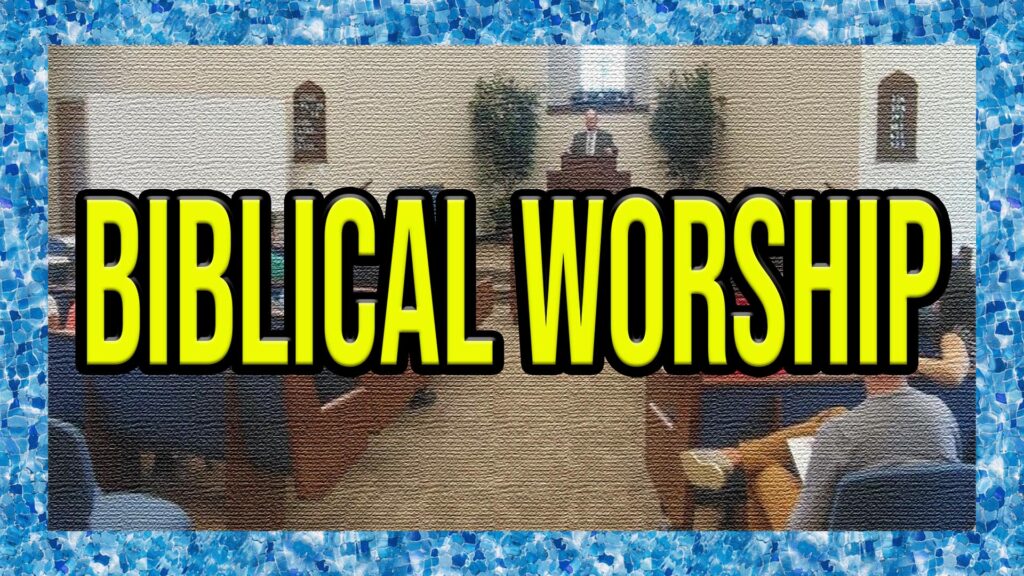
We worship according to the patterns, commands, and inferences given in the New Testament. The Object of worship and the way we are to worship are described in scripture.
Object of Worship
Only God is worthy of worship. Jesus declares in Matthew 4:10, “For it is written, ‘You shall worship the Lord your God, and Him only you shall serve.’” This then excludes worship of anything or any person other than God. When we worship God, we worship the three persons of the Godhead (the Father, the Son, and the Holy Spirit) as they are Deity and worthy of worship.
Method of Worship
John 4:24 states, “God is Spirit, and those who worship Him must worship in spirit and truth.” The word “spirit” here indicates the attitude of worship. A similar construction is given in Joshua 24:14 as “Serve Jehovah in sincerity and truth.” Based on this, our attitude in worship should be sincere and from the heart. Insincere worship is vain and not accepted by God (Luke 18:9-14, 1 Corinthians 11:27-29, Mark 7:6-7).
God indicates how He is to be worshiped during different biblical periods. During the time of the patriarchs, God discerned between the sacrifices of Cain and Abel, rejecting one and accepting the other (Gen 4:3-5). To the Jews, God clearly described worship in the books of the Law, which are the first five books of our bible. When Nadab and Abihu tried to deviate from that pattern, they were immediately destroyed (Leviticus 10:1-3)!
From the verse in Matthew 4:10, worshiping in “truth” indicates the method of worship today. In John 17:17b, Jesus states that God’s word is truth. In that word, we find the patterns of New Testament worship we are to follow today.
Five Parts of Worship
From God’s word in the New Testament, we find five parts of worship in the early Church. The commandments, patterns, and inferences in this scripture indicate that the brethren observed the Lord’s Supper, sang hymns, prayed, gave, and taught. We follow those same patterns today.
Lord’s Supper
In Matthew 26:26-29, we learn of the elements of the Lord’s Supper: Bread and fruit of the vine. 1 Corinthians 11:26 states we are to partake of the Lord’s Supper until He returns and Acts 20:7 indicates that the disciples observed it on the first day of the week. Worshiping in spirit and truth demands that we observe the Lord’s Supper on the first day of the week with bread and the fruit of the vine with no deviations from God’s word.
Singing Hymns
“Let the word of Christ dwell in you richly in all wisdom, teaching and admonishing one another in psalms and hymns and spiritual songs, singing with grace in your hearts to the Lord,” is the command of Colossians 3:16. We are to teach and admonish each other with our psalms, hymns, and spiritual songs. They are to be from the heart and not in vain. In this command and other New Testament scripture (Ephesians 5:18-20, 1 Corinthians 14:15), singing is authorized while instrumental music is not mentioned. Therefore we do not include it either in our worship.
Prayer
Our prayer in worship is directed to the Father (Matthew 6:9). It is the desire of God that we pray (1 Timothy 2:8) and that we do so to His will (1 John 5:14). As in all parts of worship, we strive to pray in spirit and in truth, as the men lead the various prayers in an orderly worship (1 Timothy 2:8-12, 1 Corinthians 14:40).
Giving
The apostle Paul gave the pattern for our giving in 1 Corinthians 16:1-2 —
“Now concerning the collection for the saints, as I gave order to the churches of Galatia, so also do you. Upon the first day of the week let each one of you lay by him in store, as he may prosper, that no collections be made when I come.” Here we have the time we are to give (Sunday) and how (as we are prospered). The concept of tithing does not apply in the New Covenant and in fact, Paul makes this statement in 2 Corinthians 9:7 — “So let each one give as he purposes in his heart, not grudgingly or of necessity; for God loves a cheerful giver.” Further, giving as part of worship is a responsibility of members of the congregation. As such, our visitors are not expected to give.
Teaching
Paul exclaims to the young preacher in 2 Timothy 4:2 to “Preach the word! Be ready in season and out of season. Convince, rebuke, exhort, with all longsuffering and teaching.” We respect that command and do so at every opportunity. Our teaching comes only from the bible as “All Scripture is given by inspiration of God, and is profitable for doctrine, for reproof, for correction, for instruction in righteousness, that the man of God may be complete, thoroughly equipped for every good work.” (2 Timothy 3:16-17)